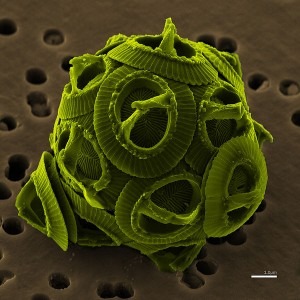By: Dr. John Kyndt – Head Scientist of the Renewable Energy Program at Advanced Energy Creations Lab.
 If you follow the algae for biofuels literature somewhat closely and critically you will be aware that further research is required to turn this concept into an economically viable and sustainable solution.
If you follow the algae for biofuels literature somewhat closely and critically you will be aware that further research is required to turn this concept into an economically viable and sustainable solution.
The numbers for target yields are somewhat dispersed, but on overall everyone can agree that the yields of oil/day/surface area need to increase about 10 fold and the capex needs to decrease at least 3 fold.
The researchers most logic response to this is to develop genetically engineered algae. Algae GMO’s, to produce more lipids for the same amount of biomass (or increase the growth rate, which essentially gives you the same result).
This in its own presents challenges as we have mentioned in other articles (e.g. developing the genetic tools, identifying the gene pathways to engineer, etc.).
As the interest in the algae for biofuels topic has grown exponentially in the last two years, significant progress is being made to overcome these challenges. However, genetically modified algae (or GMO algae) are still confined to a handful private sector labs and a few academic institutions and a widely distributed superior GMO algae is likely to be a while away.
However, let’s assume for a moment that these scientific hurdles are overcome. At that point algae will be in the spotlight again as it will join the public and political global debate on the use of GMOs in agriculture.
The main criticism with GMOs is the fear of spreading ‘foreign’ DNA into nature which could eventually end up in other species and humans and cause unpredicted effects with ‘Armageddon-like’ consequences.
On the other hand, scientists advocate heavily that in essence this is no different than breeding and domestication of plants that has been done for thousands of years, except that we now have the technology to obtain these results faster.
One advantage is that GMO algae are not projected to be used for direct human food consumption, although I doubt if that will ease the approval process of using GMO algae in large scale open ponds. The use of GMO algae is one area where closed photobioreactors have a leg up on open pond raceways (see the earlier blog on open ponds-PBRs).
No doubt that scaling GMO algae for commercial production will open a large public debate and engage political lobbying to approve the necessary regulations. If not approached in a rational way this has potential to harm the entire algae for biofuels concept.
This is the reason why in our research we try to focus on non-GMO technologies for manipulating algae and at the same time design attenuated algae that cannot grow outside a cultivated environment. This approach is a similar to the use of E. coli, which is a natural human intestinal bacterium that is now widely used for research and commercial industrial applications.
Although directed engineering of the species is expected to weaken its ecological fitness, it is beneficial to use the genetic tools described above to engineer the selected algae in such a manner that the competitive advantage of the new species is only maintained under controlled conditions.
Nevertheless the discussion of genetically altered algae is unavoidable and will soon reach the level where public opinion and political decisions will have a critical effect on the success of algae for biofuels on a large commercial scale.
Member of American Aquabiotech, Biofuels Revolution, Algae for Biofuels, Moura Enterprises and MyBeloJardim (ver. Portuguese) Group
Return to Posts Excerpts, click here:



[…] However, in pretty much all of these cases we still have to overcome challenges with economic scalability and further optimization through GE is necessary and expected. In addition, even when for example a ‘superalgae’ can be engineered, we have already cautioned for the public perceptions and potential hazards that could arise when using these on a large scale (Algae GMO’s: The Next Big Challenge in Algae for Biofuels?) […]
[…] mentioned in our blog earlier there are definitely challenges beyond the technical hurdles (Algae GMO’s: The Next Big Challenge in Algae for Biofuels?) . In the long run, a lot of regulatory and political challenges will arise with the use of GMO […]
[…] mentioned in our blog earlier there are definitely challenges beyond the technical hurdles (Algae GMO’s: The Next Big Challenge in Algae for Biofuels?) . In the long run, a lot of regulatory and political challenges will arise with the use of GMO […]
[…] However, in pretty much all of these cases we still have to overcome challenges with economic scalability and further optimization through GE is necessary and expected. In addition, even when for example a ‘superalgae’ can be engineered, we have already cautioned for the public perceptions and potential hazards that could arise when using these on a large scale (Algae GMO’s: The Next Big Challenge in Algae for Biofuels?) […]
[…] Algae GMO’s: The Next Big Challenge in Algae for Biofuels? […]
[…] Algae GMO’s: The Next Big Challenge in Algae for Biofuels? […]